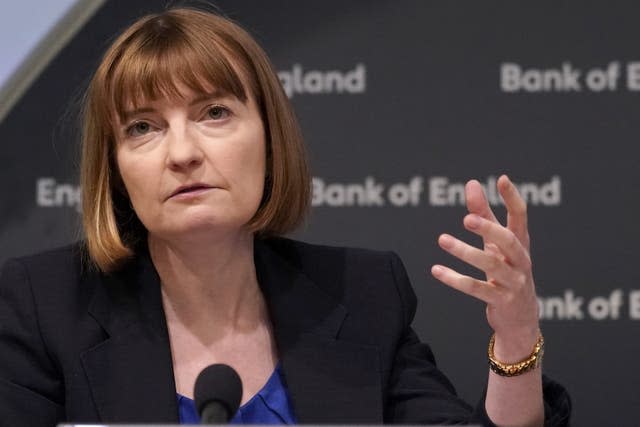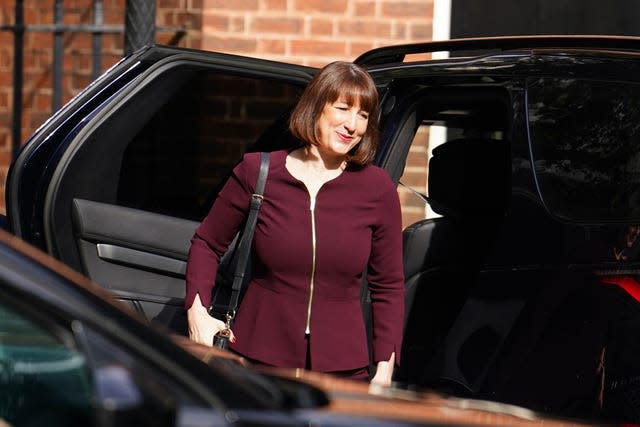Why have interest rates fallen, and what does it mean?
The Bank of England has cut interest rates for the first time in four years, after inflation fell back to normal levels earlier this year.
Rates had been at a 16-year high of 5.25% since last summer – but on Thursday, they finally started to come down.
Here the PA news agency looks at what the decision means and what the Bank expects to happen to the economy.
The Monetary Policy Committee voted by a majority of 5-4 to reduce #BankRate to 5%. Find out more: https://t.co/zBZeLlwSxD pic.twitter.com/YOcCTfER5o
— Bank of England (@bankofengland) August 1, 2024
– What happened to interest rates on Thursday?
The Bank of England’s Monetary Policy Committee (MPC) cut the base interest rate to 5%, a quarter point reduction.
It is the first time it has brought interest rates down since 2020, and ends a year-long stretch of rates being held at their highest point since the 2008 financial crisis.
But it was a knife-edge decision. Only five out of nine committee members wanted to cut, and the Bank’s chief economist Huw Pill was one of the four who voted to keep rates at 5.25%.
Andrew Bailey, the Bank’s governor, and Clare Lombardelli, the newly appointed deputy governor for monetary policy, voted in favour of the cut.

– What does it actually mean?
The base rate roughly sets the price that commercial banks charge customers for mortgages and loans.
Hikes in recent years have left mortgage rates much higher than was normal for most of the last decade.
How much it will actually affect mortgage prices on offer is up for debate, however, because they had already started falling this summer in anticipation of a rate cut.
Richard Donnell, executive director of research at Zoopla, said it will give a “further confidence boost to the housing market rather than heralding the start of a big drop in mortgage rates”.
The base rate also dictates the interest rates offered by banks on savings accounts, meaning these are also likely to fall.
– What about inflation?
Raising interest rates is the central bank’s main way of reducing inflation – the measure of how fast prices increase over time.
The main inflation figure, which covers the whole economy, fell back to the Bank’s target of 2% in June, prompting calls for interest rates to come down again.
But the committee has been cautious about cutting rates until now because prices have continued to rise quickly in areas like the services industry.
Mr Bailey said on Thursday that Britain has “truly come a long way in returning inflation to target”.
He added that policymakers must be “highly alert” to signs that inflation might increase again. He added: “We need to watch this very carefully.”
– Will rates continue to fall now?
The MPC, which makes rate decisions, is due to meet three more times this year.
Mr Bailey did not rule out cutting rates again at the next meeting in September, but set the scene for a slow-and-steady approach.
He said: “We need to put the period of high inflation firmly behind us. And we need to be careful not to cut rates too much or too quickly.”
– What about the Government?
Chancellor Rachel Reeves welcomed the cut, but warned “millions of people are still paying higher mortgage rates” following the 2022 mini-budget under Liz Truss.
She said: “Homeowners will welcome this cut in interest rates, but I know that millions of people are still paying higher mortgage rates after the Conservatives mini-budget less than two years ago that sent interest rates and mortgage rates soaring.
Meanwhile, former prime minister Rishi Sunak said it was “good news for homeowners and shows Labour inherited a strong economy”.

– Does this mean the economy is doing well?
Mortgage rates are still high, but a cut to the base rate is good news for the housing market. It also indicates that the Bank thinks inflation is under control.
That is a small positive for consumers, as it means prices on everyday shopping items are rising slower than before.
The Bank’s latest economic report also indicated that gross domestic product – the main measure of economic growth – is set to grow more than previous estimates this year.
It is still a complicated picture, but Mr Bailey said: “Inflationary pressures have eased enough that we’ve been able to cut interest rates today.”
– What do other people think of it?
The leader of the Unite trade union criticised the interest rate decision as being “too little, too late” for working families, and urged more cuts.
Unite general secretary Sharon Graham said: “Interest rates still stand at historic highs and this small cut will offer little help to workers struggling with the cost-of-living crisis and record housing costs.”
Meanwhile, Alpesh Paleja, interim deputy chief economist of the CBI business group, said: “At best, there is only mixed evidence that inflation persistence has been defeated.
“While the labour market is loosening and wage growth slowly easing, the unexpected strength in services inflation remains a red flag.
“We still think that today’s meeting marks the start of a rate-cutting cycle, but the pace of this is now more uncertain.”


